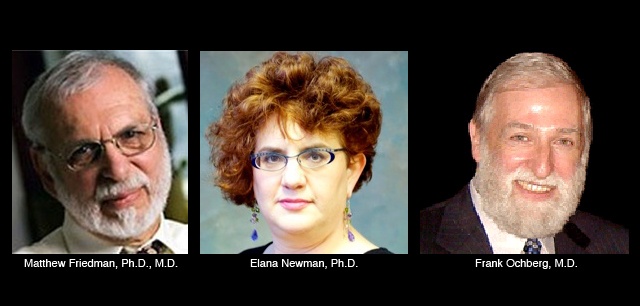PTSD vs. PTSI: More Than A Name
With suicide rates in the U.S. armed forces at record highs, debate is raging about whether changing the name post-traumatic stress disorder (PTSD) to post-traumatic stress injury (PTSI) would help reduce stigma. The Dart Center asked three leading clinicians and researchers to weigh in.

Friedman, Newman and Ochberg are pioneering trauma experts.
With suicide rates in the U.S. armed forces at record high rates, debate is raging about whether stigma is deterring combat veterans – and other trauma survivors – from getting the help they need. Clinicians, veterans and advocates are taking sides over whether changing the name post-traumatic stress disorder (PTSD) to post-traumatic stress injury (PTSI) would help. As the American Psychiatric Association enters its final months of deliberation over a new edition of its Diagnostic and Statistical Manual, this debate has exposed underlying issues that go beyond a clinical label. The Dart Center asked three leading clinicians and researchers to weigh in.
An Injury, Not A Disorder
By Frank Ochberg, Ph.D.
Post-Traumatic Stress Disorder has been an accepted diagnosis since 1980. It's time for clinicians to adopt a new name - Post-Traumatic Stress Injury - that is more accurate, hopeful and honorable.
Post-Traumatic Stress Disorder – PTSD – has been an accepted diagnosis since 1980. And that's a good thing. So why is it now making controversial headlines? Why are some clinicians like myself – along with a wide range of veterans’ advocates, women’s groups and others – arguing for changing the name of the diagnosis, PTSD, to PTSI – for Post-traumatic Stress Injury?
***
PTSD is PTSD
By Matthew Friedman, M.D., Ph.D.
Changing the name of PTSD won't eliminate stigma or make sufferers more likely to seek treatment.
I don’t believe the American Psychiatric Association (APA) should change the name Post-Traumatic Stress Disorder (PTSD) to Post-Traumatic Stress Injury (PTSI) because I don’t believe that such a change will make a significant difference with regard to stigma or make sufferers more likely to seek treatment. I further believe that Canada’s military has come up with the right solution: classification of post-traumatic stress as an Operational Stress Injury (OSI). This policy effectively addresses any stigma-related problems without changing the PTSD diagnostic label. In other words, we can have it both ways: keep the PTSD diagnostic term and have it regarded as an injury.
Why does it matter?
***
Where All Sides Align
By Elana Newman, Ph.D.
While the debate is focused on the power of naming a disorder, it really represents a far more important set of nuanced issues and assumptions about the nature of psychological responses after surviving catastrophe, brutal deaths, war, sexual assault and other horrific life events. It also represents differing views on how best to achieve needed cultural changes.
For reporters covering this debate as it unfolds over the coming months – whether about veterans, public health, science or policy – it is crucial to understand that there are many points of agreement among these contending experts. Most fundamentally, both sides are deeply committed to remedy any long-standing problems that survivors face after confronting a traumatic event. While the debate about the APA diagnosis rages on, it’s important that the media and the public do not lose sight of just how much agreement there is among mental health professionals when it comes to trauma and PTSD.



































































































